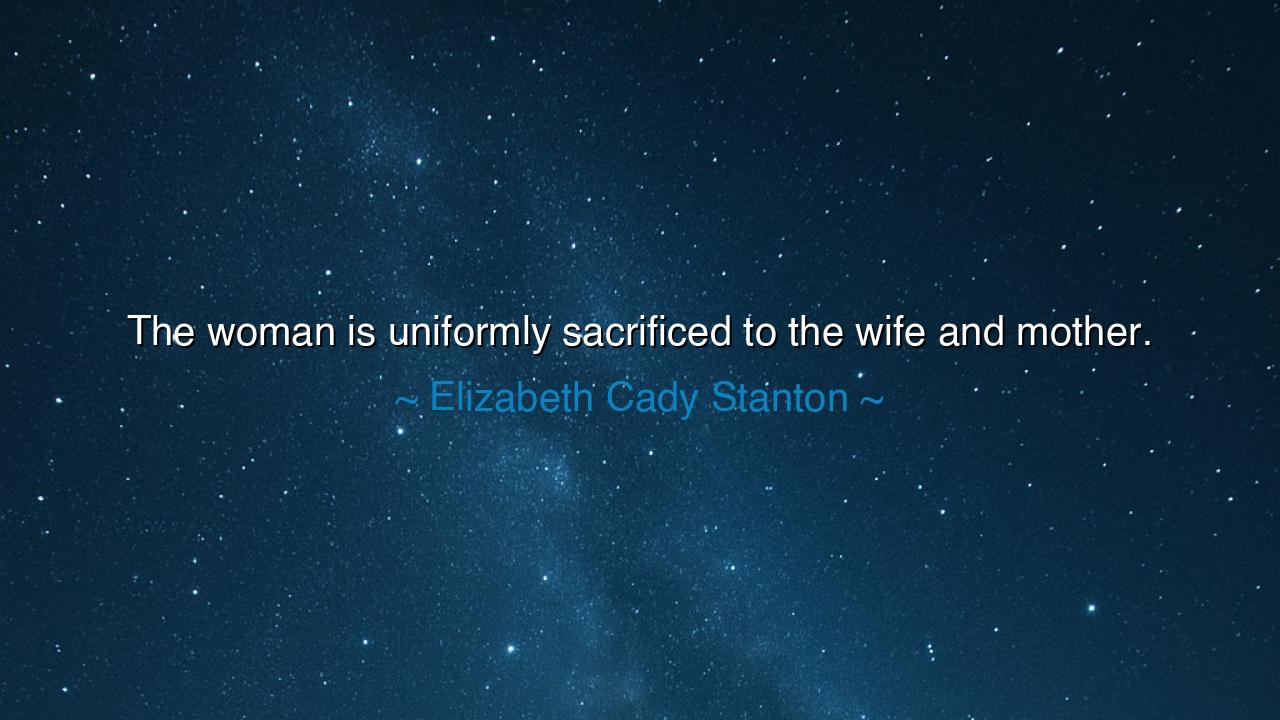
The woman is uniformly sacrificed to the wife and mother.






Hearken, O seekers of understanding, to the fire-born words of Elizabeth Cady Stanton, who declared: “The woman is uniformly sacrificed to the wife and mother.” In this phrase lies a cry that echoes through the centuries — a lament not of love, but of loss; not of motherhood itself, but of identity surrendered to expectation. Stanton, a pioneer of women’s rights and a fierce voice of the nineteenth century, saw clearly what many feared to name: that society, in exalting the roles of wife and mother, too often extinguishes the woman — her intellect, her individuality, her will to exist beyond duty.
In the ancient world, as in Stanton’s own time, the female spirit was revered for her nurturing and devotion, yet constrained by the same reverence. She was praised as mother, honored as wife — but rarely permitted to be herself. Stanton’s insight pierces this illusion of reverence. She saw that in the name of love and virtue, women were often taught to dissolve their own desires, dreams, and ambitions for the sake of others. To be a good wife was to yield; to be a good mother was to forget oneself. Thus, beneath the praise lay the chains of sacrifice — soft, gilded, but unbreakable.
Stanton’s words were not born of rebellion against marriage or motherhood, but against imbalance. She did not despise the sacred roles of family life; she sought to restore choice to the woman within them. She envisioned a world where a mother could nurture and still dream, where a wife could love and still lead, where the woman within these roles could breathe freely. Her message was not a rejection of the home, but a demand that the soul of the woman be recognized within it — that her worth not be measured by her service, but by her essence.
Consider the story of Mary Wollstonecraft, mother of Mary Shelley, who penned A Vindication of the Rights of Woman nearly a century before Stanton’s voice rose in America. Wollstonecraft herself was torn between devotion and selfhood, love and independence. She wrote passionately that women were not born to be ornaments or servants, but moral and rational beings equal to men in capacity. Yet, in her own life, she felt the pull of society’s expectations — a tug-of-war between the lover, the mother, and the thinker. In her, as in Stanton’s lament, we see the cost of a world that demands the woman disappear behind the roles she fills.
The deeper meaning of Stanton’s quote is this: when society demands self-erasure in the name of love, it corrupts both love and self. The mother who cannot be herself teaches her daughters to do the same. The wife who is praised for silence creates a lineage of silenced voices. Stanton’s wisdom urges us to see that the wholeness of womanhood — intellect, emotion, purpose, and identity — must not be divided by titles. A woman is not less when she is wife or mother; she is less only when she is denied the right to be herself while being so.
Yet her insight also carries a lesson for all humanity: that love, to be pure, must never require the death of self. True love liberates, it does not consume. The family, the marriage, the bond between generations — these flourish not through sacrifice of identity, but through its celebration. For what child does not thrive under the care of a mother who lives fully, who teaches by example that a soul has worth beyond its service? What union does not deepen when both hearts remain whole?
The lesson, eternal and fierce, is this: a woman must not vanish into the roles the world assigns her. Let her be mother, but also thinker; wife, but also dreamer; nurturer, but also creator. Let society learn to honor not just her labor, but her mind, her passion, her individuality. For the world that forces women to sacrifice themselves to their titles breeds quiet sorrow, but the world that lets them live as whole beings will birth generations of strength, equality, and grace.
So let Stanton’s words ring across the ages as both warning and wisdom: “The woman is uniformly sacrificed to the wife and mother.” Let the future, then, be shaped not by sacrifice, but by balance — where love and identity walk hand in hand, and the woman, in all her fullness, stands unbroken beneath the sun.






AAdministratorAdministrator
Welcome, honored guests. Please leave a comment, we will respond soon